

There’s nothing like a spoonful of nut butter for an indulgent snack between meals. Well, unless you’re allergic to nuts, of course. If that’s the case, what are your options? “Nut butter alternatives are popular among the millions of Americans with diagnosed nut allergies, and among those sensitive to nuts,” says Kim Yawitz, RD, a registered dietitian in St. Louis, Mo.
And it’s not just those who are allergic to nuts opting for these nut-free spreads. People may also choose to eat nut butter alternatives “to add additional nutrients to their diets, or simply because they prefer the taste or texture of non-nut butters,” says Amy Gorin, MS, RDN, an inclusive plant-based dietitian and owner of Master the Media in Stamford, CT.
What are peanut and nut butter alternatives?

As Yawitz explains, substitutes for peanut butter and nut butters use a variety of ingredients such as soy nuts, sunflower seeds, pumpkin seeds, hemp seeds, coconut, and even oats, many of which can increase nutrient diversity in the diet.
“Different types of nuts and seeds, for example, have different nutrient profiles and therefore different health benefits,” says Yawitz. “Some studies suggest that the nutrients in nuts and seeds work synergistically rather than in isolation, so eating a wide variety of nut butter alternatives could be beneficial even if you don’t have an allergy or intolerance.”
One more thing to note before you dive into the wonderful world of nut butter swaps: “There are many delicious varieties of non-nut butters out there. Experiment and see what strikes your palate. You can use these non-nut butters in any way that you would use a traditional nut butter—such as in smoothies,” says Gorin.
Here are 5 peanut butter alternatives that our nutritionist experts love.
Sunflower seed butter
Yep, the seeds you’ve been snacking on for ages is the base for an excellent nut butter alternative. “This is probably the most popular non-nut butter out there, as it substitutes nicely into a PB&J and pairs really well with sliced apples and pears,” says Gorin. “Per two-tablespoon serving, you get seven grams of protein and four grams of fibre. You also get plenty of heart-healthy fats and a little bit of iron, potassium, and calcium.”
Tahini
If an everything bagel is the only time you’re getting a sprinkling of sesame seeds in your diet, you’re missing out on some major flavour and nutrients.”Sesame seeds have more cholesterol-lowering phytosterols than any other type of seed or nut. In one study, adults with high cholesterol who ate 40 grams of white sesame seeds per day saw up to 16 percent reductions in LDL (‘bad’) cholesterol,” explains Yawitz. “One easy way to incorporate more sesame seeds into your diet is to replace your usual spread with tahini—an earthy nut butter alternative that’s great on sandwiches or drizzled over roasted vegetables.”
Yawitz shares that it’s easy to make your own tahini. “Lightly toast hulled sesame seeds in a large pan for one-to-two minutes over medium heat, then toss them in a food processor for several minutes until you achieve a creamy texture,” she says, noting that if you choose to buy it at the store, look for brands that use only sesame seeds to keep calories, fats, and sugar at bay. Whether you use tahini to make tahini sauce or spread it on toast in lieu of nut butter, it’s a great staple to have in your kitchen.
Watermelon seed butter
Yep, this exists. “You get a lot of nutrition in this seed butter! Per two-tablespoon serving, you get a good amount of protein (eight grams), some fibre (one gram), as well as heart-healthy fats (14 grams),” says Gorin. “You also get a lot of minerals, including magnesium, zinc, phosphorous, iron, and copper. These are all essential minerals.”
Flax butter

Also known as flax seed butter, this nutrient-packed offering is a solid choice on the nutrition front. “Flax butter is an excellent source of fibre, with some heart-healthy omega-3 fats to boot,” says Yawitz. Gorin also likes that flax seed butter gives people a good amount of plant-based iron, as well as some potassium and calcium.
“Just two tablespoons of flax butter provide nine grams of fibre, which is more than one-third of the daily recommended intake for women,” says Yawitz. “In one recent study, adults who ate 30 grams of flaxseeds per day had significant reductions in body mass index, blood pressure, and total cholesterol after 12 weeks.” That’s why Yawitz suggests adding a bit of flax butter to your smoothies or sandwiches. “[It’s] an easy way to incorporate more flax into your diet.
Granola butter
“Granola butter is a relatively new nut-free butter that’s made with oats and seeds, plus spices and a bit of oil,” comments Yawitz. “Some brands also offer flavoured varieties, with mix-ins like chocolate chips and dried fruits. Whether you buy an unflavoured or a flavoured variety, pay attention to added sugar and saturated fat on the food label, and be sure to mind your portion sizes (because this stuff is dangerously tasty).”
Nutrition-wise, Yawitz says that one two-tablespoon serving of granola butter contains 215 calories, 3 grams of added sugar, and five grams of saturated fat. “So while it can absolutely be a part of a healthy diet, it’s definitely best to enjoy granola butter in moderation,” she says. “On the upside, one serving of granola butter provides four grams of fibre,” she continues, suggesting people spread it on an apple or a piece of whole-grain toast as “a delicious way to get in a hefty dose of belly-filling fibre at breakfast.”
Watch portion size with nut butter alternatives
Caveat emptor: “In my experience as a private practice dietitian, it’s really easy to overeat nut butter and nut butter alternatives,” cautions Yawitz. “Two tablespoons is a lot smaller serving than most people realise, and a lot of my clients are shocked by their calorie and fat intake when I have them actually measure [that amount].”
As Yawitz elaborates, even healthy nut-free butter products “can contribute to weight gain and subsequent health issues if you’re eating too much, so measuring out your portion size every now and again can help keep you honest.”
This story first appeared on www.marthastewart.com
(Main and Feature Image Credit: Oleh_Slobodeniuk / Getty Images)
© 2021 Meredith Corporation. All rights reserved. Licensed from MarthaStewart.com and published with permission of Meredith Corporation. Reproduction in any manner in any language in whole or in part without prior written permission is prohibited.
The post The 5 most mouthwatering nut butter alternatives, according to nutritionists appeared first on Lifestyle Asia Hong Kong.

